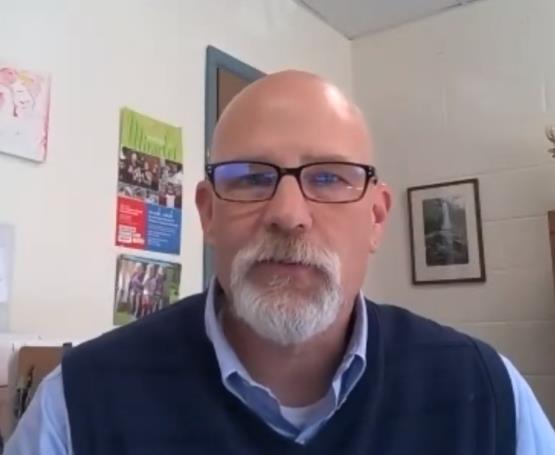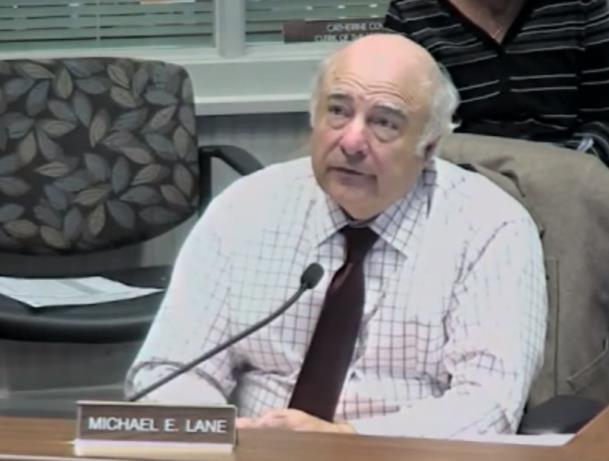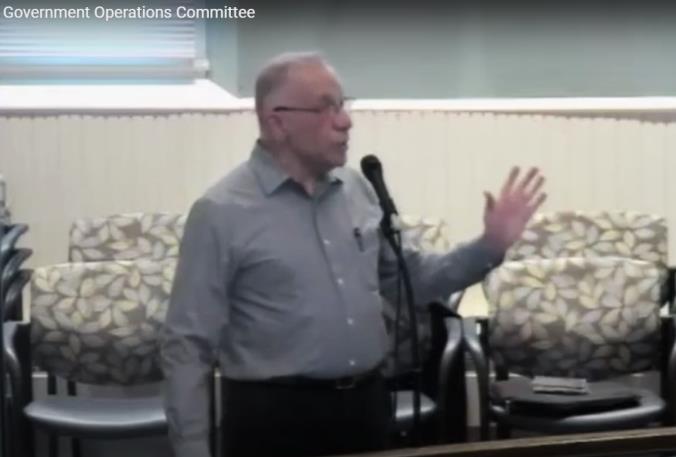Big Changes Coming (Again) as County Reval Plans Evolve
by Robert Lynch; October 11, 2022
Tompkins County Director of Assessment Jay Franklin said inspiration hit when he’d least expected it.
“Finally, one Saturday morning, I woke up, got my coffee, went out on my deck, and I finally found the benefits of remote work,” Franklin told the County Legislature’s Government Operations Committee October 6th.

True, a few among us might have wished the Director had stayed in bed.
Franklin’s caffeine-stoked inspiration—he told the committee that “lightbulbs went off” in his head—led him to turn about-face on a recommendation he’d made to that same group of lawmakers just one month earlier.
Gone now are the Assessment Department’s plans to revalue Tompkins County properties only once every three years and to couple that “triannual” reassessment with a fractional valuation plan that the Director conceded was “just misleading” and “non-transparent.”
Instead, Franklin’s revised strategy would have the department revisit everyone’s assessment each and every year. As such, it would likely increase most everyone’s valuations yearly as long as home values keep spiraling upward. Given his office’s limited staff and work space, the only way annual revaluation remains possible is through “sampling,” the Director told the committee.
In its most brutal, sledgehammer sense, “sampling” would have County staff revise your own property’s value not based on a particularized curbside inspection of your own home, but rather on what they might see at your neighbor’s property down the road.
And while assessors would attempt to distinguish his mansion from your hovel, the “trending” component inherent in the sampling methodology could still contaminate a home’s actual worth, despite everyone’s best intentions.
And there’d be a second change; a procedural one. Because of the mountains of new paperwork that universal annual reassessment would entail—and the flood of resident complaints that would likely follow—Franklin plans to rewrite the complaint procedures in a way that could frustrate many an aggrieved homeowner. No longer would the phone call or an office visit become the first opportunity for protest. Instead, an owner would first need to fill out a form and explain to assessment staff in writing why they believe their home was wrongly valued.
“Rather than allow in-person or telephonic appointments, we will only accommodate online/paper submissions,” Franklin wrote the County Legislature in a September 28th memo. “We have found that the in-person or telephonic appointments do not present us with any more information and in fact these appointments typically present less information than the appointments that are filed online/paper,” the Director wrote.
Owners will “be able to provide something to us,” Franklin told the committee in defense of the paper-first complaint process. “Right now, they’d come in, and talk to us and provide us with nothing. That’s a wasted ten-minute appointment.”
A personal visit could come later, Franklin assured the committee at its meeting. But a shuffling of paper back-and forth would need to happen first. In fact, it’s possible the owner might not meet with anyone face-to-face until Grievance Day at the end of May.
“There are people out there, many of them senior citizens, many of them whose verbal skills are not their strong suit, who can’t really write a letter,” Enfield Councilperson Robert Lynch (this writer) told the Government Operations Committee prior to Jay Franklin’s presentation. “But you know what they can do? They can come down Wednesday morning to that Assessor’s Office on Buffalo Street, look the person in the eye and say, ‘With all due respect, sir or madam, you’ve got it wrong. My property was overvalued by you, and here’s the reason why.’”
In his later remarks to the committee—and somewhat in conflict with his less compromising earlier-written statements—Franklin walked back his insistence on written-only communication.
“Our doors aren’t going to be locked. ” Franklin assured the committee. “Let’s dispel that misconception. We’re still going to be here…. The public can always call us up and say, ‘Hey, Jay, I think I’m over-valued.’”
“So we’re taking those phone calls and we’re going to review them,’ the Assessment Director told committee members. “We’re always more than willing to sit down with a property owner whenever they have questions about their assessment.”
Yet Franklin also held firm to his streamlined stipulations, “(With) that first step, we want to screen property owners and make sure that their time is valuable and useful and our time` is valuable and useful.”
In other words, homeowners, do your homework first.
As for the adoption of assessment sampling, a technique the Director said the State routinely undertakes, Franklin promised committee members his people won’t inflate everyone’s values equally.
“We’re looking at (properties) by town; by neighborhood,” Franklin said. “We’re sampling parcels through different building styles, land sizes, building condition, building grade, value ranges in order for us to try to find where the market is moving and be able to accurately adjust those values.”
Franklin added that the “better-condition houses” those that are “move-in ready” have escalated in price faster than have “lower-end, poorer condition houses.” Yet in many cases, assessments would move up and down by class under the new procedures. Nuance might escape the process.
Last year, after a several-year hiatus, Tompkins County resumed its more than half-century tradition of assembling Local Boards of Assessment Review in each of its towns, enabling local people to hear local complaints. Local Review Boards can only recommend assessment changes; they cannot demand them. Last spring, only two owners grieved at the one-day local review in Enfield. Franklin recommends that local sessions again be cast aside.
“These Boards were put in place back in 1968 when we went county-wide assessment,” Franklin explained to the committee. “This was back when people didn’t want to come down to the City of Ithaca. We put these in to allow them to go out and see a local face, and then that local face should be able to provide a recommendation to the (County) Board of Assessment Review.”
In some towns, Franklin claimed, no one this year showed up. He termed the local boards “just not worth the time, the cost, and the effort.”
What’s more, the Director said, “It’s misleading to the property owners too.”
“If they go before someone, they think that they can affect that change, but unfortunately that’s not how these work,” the Director cautioned.
Interjecting her own comment, Ulysses-Enfield legislator Anne Koreman said she’d support the Local Boards’ abolition. Koreman argued local boards draw Assessment Department staff away from other, more pressing assignments. Enfield’s other County legislator, Randy Brown, Tuesday indicated his continued support for the Local Boards.
****
If given more personnel, the shortcuts the Assessment Director envisions could be avoided. Yet Franklin showed no interest to the committee for enlarging his staff. County Assessment once had 19 people. It now claims only ten. It’s given over part of its floor of offices to Information Technology. So if the County were to hire more people—and if Franklin were able to fill the slots—he’d have little place to put them.
County Legislator Mike Lane is among those who would give the Assessment Director more people to do the job right. Yet no one else on the Government Operations Committee openly shared the Dryden legislator’s sentiment. Lane also disputed Franklin’s claim that the Local Boards are a waste.
“I would think that it would look kind of weird to the public to do away with them,” said Lane, among those legislators who pull one-day stints as local reviewers. “I don’t think it’s a waste of legislators’ time. We’re there. We’re available…. And they get to look at us, and they’ve got somebody listening to them.”

Exactly how much power the County Legislature holds to impose its will over Franklin’s department remains unclear. The Legislature could authorize increased staff. It could also mandate the local hearing boards. However, it will likely do neither. As such, the Director of Assessment’s revisions will likely become a baked-in change.
“What I’m urging you today to do is to hold off on endorsing the Director of Assessment’s recommendations,” Enfield Councilperson Lynch told the legislative committee, a delaying action it subsequently declined to take. “I think they need more study. I think the public needs to weigh in. I think Town Boards like ours need to weigh in. “
Lynch also suggested the committee seriously consider legislator Lane’s suggestion for increased departmental staffing. “Let’s give the Assessment Department all the resources it needs to conduct annualized assessments with face-to-face meetings just like it’s always been done…. I think we’ve got the money in the budget, thanks to increased assessments. We’ve got money to spend on this. And I think we should.”
###
And How I Addressed the Issue:
Enfield Councilperson Robert Lynch, addressing the Tompkins County Legislature’s Government Operations Committee October 6th:
****
“I’ve found in life the most effective form of persuasion is the face-to-face meeting. I could have written you an email. I could have sent you a letter. But no, I’m here looking at you face-to-face in this meeting. And that’s why I’m talking to you today.

“Last month, this committee recommended at the Assessment Director’s recommendation that you go to a triennial assessment cycle. Which would mean reassessing properties once every third year, and then also pro-rating, if you will; adjusting; fractionalizing assessments to balance things out. That was recommended. And surprisingly, at the last Legislature meeting, the committee Chair pulled that resolution. And now we know why.
“On the 28th of September, the Director of Assessment sent a memo indicating he proposes changes that would keep you on an annual assessment cycle. But there’d be changes. And the one I’m most concerned about is his proposal to eliminate the opportunity for aggrieved property owners to come to his office and talk to the assessor face-to face.
“I talked to my sister about this a day or two ago when I first learned about this. You know my sister. She used to work for the County. And she says, ‘You know, Bob, people like you and me, who can put two sentences together and make a cogent argument, that’s fine. But there are people out there, many of them senior citizens, many of them whose verbal skills are not their strong suit, who can’t really write a letter, they may not have Internet access to even put forth an email.’ But you know what they can do? They can come down Wednesday morning to that Assessor’s Office on Buffalo Street, look the person in the eye and say, ‘With all due respect, sir or madam, you’ve got it wrong. My property was overvalued by you, and here’s the reason why.’
“That opportunity’s going to be eliminated. Also, according to the Assessor’s recommendation, the Town Local Assessment Review Boards would be abolished, again. The only opportunity for a face-to-face confrontation would be on Grievance Day. And you know there are a lot of people who show up on Grievance Day.
“I’m a member of a town board. I have asked that our Town Board consider this change in policy at a special meeting we have tomorrow night. We meet again next Wednesday. We may pass a Resolution to this effect. What I’m urging you today to do is to hold off on endorsing the Director of Assessment’s recommendations. I think they need more study. I think the public needs to weigh in. I think Town Boards like ours needs to weigh in.
“Many of you who sit on this committee have not been on a Town Board. I am on a Town Board. And I know one of my most frequent complaints from the public is ‘why did my assessment go up so high?’ And I have to explain to them Tompkins County is unique among counties in New York State. We do county-wide assessment. We, the Town, have no control over it. Please go downtown and talk to the assessor. Well, that’s easier now than it may be in the future; because you may not be able to do so. You may not be able to call that assessor on the phone. It’s going to be much more difficult. And I think it would be short-sighted to endorse these recommendations.
“I like what Legislator Lane said last month: Let’s give the Assessment Department all the resources it needs to conduct annualized assessments with face-to-face meetings just like it’s always been done. That’s the way I think we should go.
“I think we’ve got the money in the budget, thanks to increased assessments. We’ve got money to spend on this. And I think we should.
“Thank you.”
###

